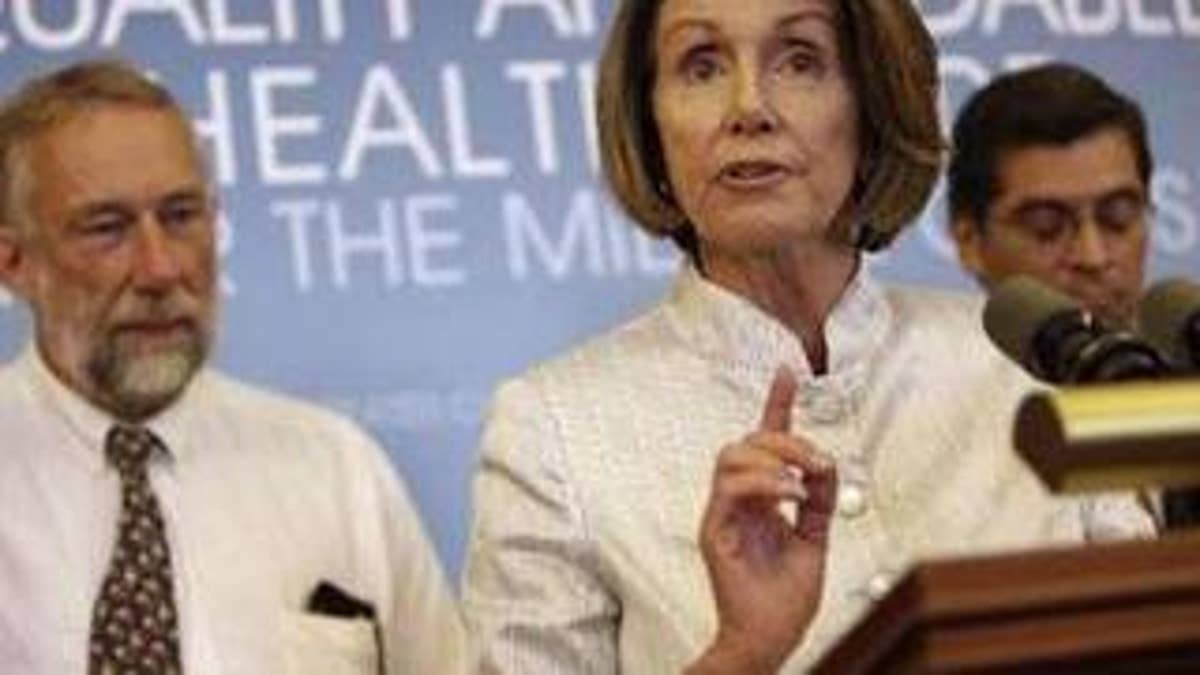
House Democrats will enter a critical negotiating session Monday afternoon as party leaders try to prevent internal tensions from indefinitely delaying action on a heath care overhaul.
As the Senate takes a slow-and-steady approach to its version of the package, House Speaker Nancy Pelosi continues to speak of progress in her chamber with pep and vigor.
"When I take this bill to the floor, it will win," she said Sunday. "We will move forward, it will happen."
But her public outlook belies the feud in the rank and file which has reached a rolling boil.
Fiscally conservative Democrats known as Blue Dogs delayed the work of a key committee last week over cost concerns and other issues, and after talks broke down Friday pledged to restart discussions this week.
But the leadership's willingness to hear out their concerns has drawn the ire of the most liberal members of the party, particularly the Congressional Black Caucus, which doesn't want Pelosi to cave to their demands.
Leaders must decide whether to forge ahead with the meat of a compromise before the August recess or dial back plans for action on such a condensed timetable.
House Majority Leader Steny Hoyer on Friday said it "may not be possible" to pass a bill before recess, instead suggesting lawmakers would continue to work on the package during part of their recess.
The House Energy and Commerce Committee is the only House panel yet to vote on the bill.
Chairman Henry Waxman, D-Calif., on Friday floated the idea of bypassing the committee and taking the bill directly to the House floor but later apologized to the Blue Dogs for the comments.
On the Senate side, only the Finance Committee is left to take action -- a bill has taken longer to pass there since it is trying to forge a bipartisan compromise.
Both sides of the aisle say they want to improve the system and provide care for almost 50 million Americans who lack health insurance coverage, but they remain deeply divided over how to reach that goal. Republicans said the longer the delay, the more the public understands the stakes of a policy that has vexed lawmakers for decades.
"Republicans want to protect the right of Americans to make their own health care decisions, to pick their own doctors and their own plans," said Sen. Jim DeMint, R-S.C. "We could have a plan in a few weeks if the goal is not a government takeover. We've never seen the government operate a plan of any kind effectively and at the budgets we talked about."
Democrats countered that their plans -- and there are many iterations on Capitol Hill, as committees in both the House and Senate work on versions -- would expand coverage without adding to the deficit. Even so, they are likely to leave for an August recess without a vote.
White House spokesman Robert Gibbs said they are "80 percent" in agreement on what a final version will include and are making progress.
In separate interviews, Obama adviser David Axelrod used the same line, underscoring the White House's desire to paint the missed deadline as a hiccup rather than a hurdle.
"Now, we're at the final 20 percent and we're trying to work through those details," Axelrod said during one appearance.
During another, he added: "We're less interested in hard deadlines than in moving the process forward. The deadlines have had a disciplining effect. ... What we don't want is for the process to bog down here. We want to keep moving forward, and I believe we will."
That final piece, however, will require GOP backing -- something Sen. Mitch McConnell said was unlikely. The Senate minority leader said congressional Democrats are having difficulty selling a health care bill to their own members.
"The only thing bipartisan about the measure so far is the opposition to it," said McConnell, R-Ky.
It's a reality a key Democratic senator acknowledged. Even though the Democrats enjoy a majority in the Senate, some are skittish about the financial or political costs of the proposals.
"Look, there are not the votes for Democrats to do this just on our side of the aisle," said Sen. Kent Conrad, D-N.D., the chairman of the powerful budget committee.
Or even their side of the Capitol.
Rep. Jim Cooper, a Tennessee Democrat and Blue Dog, said he doubts the Democratic-controlled House could pass a proposal.
"We have a long way to go," he said. "David Axelrod is right; we have agreement on 70 or 80 percent of the legislation, but it is important we get the other details right, too."
DeMint and Conrad spoke with ABC's "This Week." Gibbs appeared on "Fox News Sunday." Axelrod appeared on CBS' "Face the Nation" and CNN's "State of the Union. Cooper appeared on CBS' "Face the Nation." McConnell and Pelosi also were interviewed for CNN's "State of the Union."
The Associated Press contributed to this report.




